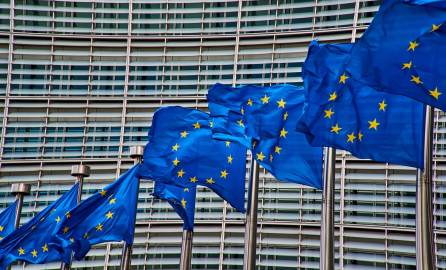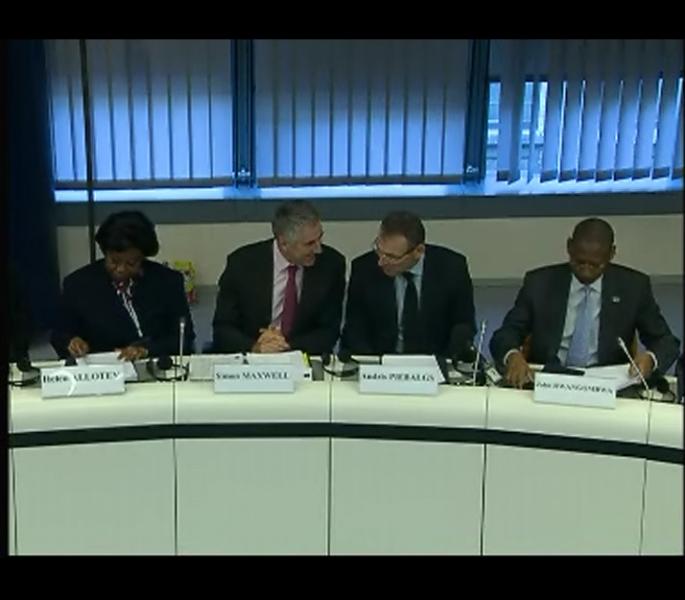The European Union’s Commissioner for Development, Andris Piebalgs, recently presented an ‘Agenda for Change’; designed to increase the impact of EU development policy and introduce a new approach on EU budget support.
Experts, parliamentarians, NGOs, partner country representatives, private sector and local government organisations offered their reactions at a recent event in Brussels.
At the event at the European Commission headquarters in Brussels, Commissioner Piebalgs said that the time had come for the EU to refocus aid priorities to ensure developing partners are on track to reduce poverty and presented a new communication from the Commission, ‘Increasing the Impact of EU Development Policy: An Agenda for Change’.
“The time is right for us to step up a gear and move into the fast lane,” said Commissioner Piebalgs. “Our 12 point agenda for change has been designed to bring about the changes that will make our development policy the best in the world.”
| The Commission proposes an Agenda for Change that would lead to: |
| • an increased share of EU country and regional cooperation programmes dedicated to the policy priorities of (i) human rights, democracy and other key elements of good governance and (ii) inclusive and sustainable growth for human development; • the concentration of EU activities in each country on a maximum of three sectors; • an increased volume and share of EU aid to the countries most in need and where the EU can have a real impact, including fragile states; • enhanced importance of human rights, democracy and good governance trends in determining the mix of instruments and aid modalities at country level; • continued support for social inclusion and human development through at least 20% of EU aid; • a greater focus on investing in drivers for inclusive and sustainable economic growth, providing the backbone of efforts to reduce poverty; • a higher share of EU aid through innovative financial instruments, including under facilities for blending grants and loans; • a focus on helping reduce developing countries' exposure to global shocks such as climate change, ecosystem and resource degradation, and volatile and escalating energy and agricultural prices, by concentrating investment in sustainable agriculture and energy; • tackling the challenges of security, fragility and transition; • joint EU and Member States response strategies based on partners'own development strategies, with a sectoral division of labour; • a common EU results reporting framework; • improved Policy Coherence for Development, including through new thematic programmes that build synergies between global interests and poverty eradication. |
Alongside the ‘Agenda for Change’, Commissioner Piebalgs also presented a second communication that outlined reforms to the EU approach to budget support, titled: ‘The Future Approach to EU Budget Support to Third Countries’.
The two communications will now be presented to Development Ministers in the Foreign Affairs Council, who are expected to sign off on the new policies next spring.
While Commissioner Piebalgs said “budget support will remain our preferred aid modality,” he also added the EU had listened to suggestions for further improvements and refined their approach to Budget Support, an aid modality that involves making financial transfers to the national treasuries of partner countries.
The European Commission is one of the largest providers of budget support in the world. Over the period 2003-2009, the EC made budget support commitments totalling over 13 billion euros, or about 25% of all its commitments in this period (scroll to the bottom of the article to see the relevant text box).
A distinguished panel gave their reactions to the new communications: John Rwangombwa, Minister of Finance and Economic Planning from Rwanda; Filip Kaczmarek, Member of the European Parliament; Helen Allotey, Director, Ministry of Finance and Economic Planning, Ghana; Tamsyn Barton, Director General, European Investment Bank; Nuria Molina, Director of European Network on Debt and Development and a special response to the communications was provided by Simon Maxwell from the Overseas Development Institute, UK. There was lively discussion, with questions and comments from members of the 200-strong audience.
Check a recording of the Commissioner's presentation and Mr Maxwell’s response.
Partner Country Reactions
Representatives of partner nations Ghana and Rwanda, who took part in a post-presentation panel discussion, broadly welcomed the new communications.
“The documents contain a lot which is greatly appreciated, because at least it demonstrates that the EU will continue to give resources to our developing countries,” said Ms Allotey, of Ghana.
Ms Allotey particularly welcomed the communications’ emphasis on the need for partner country ownership and her country’s readiness to demonstrate that ownership and transparency of operations that the Commissioner emphasised as important to continued budget support.
Some 70 % of EU aid to Ghana is delivered through the budget support mechanism. According to the Commission, this has given the government of Ghana greater control over resource allocation and spending and has helped the country make significant strides towards meeting the targets laid out in the Millennium Development Goals.
Mr Rwangombwa, Minister of Finance and Economic Planning from Rwanda, was also supportive and welcomed the Commissioner’s focus on mixing budget support with other types of development financing and reaching out to find new ways to collaborate with the private sector.
“The fact that they are stressing the modality of budget support as their best modality is very important for us as a recipient country,” said Mr Rwangombwa from Rwanda. “Mixing aid with loans, mixing grants with loans, mixing aid with private sector development – I think those are key points that I liked in this strategy.”
Both Ms Allotey and Mr Rwangombwa welcomed the commitment for more joint programming with EU member states, but wanted to see more details on how this might be achieved in practice.
To see interviews with Ms Allotey and Mr Rwangombwa, click on the video below.
Getting the Details Right
Mr Maxwell welcomed the emphasis on good governance, the new focus on growth, the proposal to target aid spending on countries that need it most and the call for the Commission to harmonise activity better with member states.
To see an interview with Mr Maxwell, watch the video below.
He also pointed out that there remain a number of important and difficult questions to be answered before the policies are implemented .
“What’s the job to be done? It’s to fill in the detail that doesn’t exist at the moment,” said Mr Maxwell. “For example, I think it’s great to say that we should concentrate aid more on the poorer countries, and perhaps spend less in middle income countries. Question: How much do we spend now in middle income countries and how much are we going to spend in five years’ time?”
Mr Maxwell welcomed the timing of the new communications, which he believes come at an important juncture for the aid community at large.
“The world is changing really fast and we have a whole set of forest fires out there – the global crisis, climate change, the Arab Spring, the limits of planetary boundaries in the fields of water, and so on – and all these are presenting real challenges to development cooperation,” said Mr Maxwell. “So it’s right that we stand back and say ‘Have we got the right framework and the right policy?’ and we try to reorientate development cooperation for the future. And that is what I think Andris Piebalgs is trying to do.”
| Budget Support |
| Budget support will be provided as a "vector of change" to address five key development challenges and objectives: 1. Promoting human rights and democratic values, 2. Improving financial management, macroeconomic stability, inclusive growth and the fight against corruption and fraud, 3. Promoting sector reforms and improving sector service delivery, 4. State building in fragile states and addressing the specific development challenges of small island development states (SIDS) and overseas countries and territories (OCTs) and 5. Improving domestic revenue mobilisation and reducing dependency on aid. To support these objectives, the European Commission will provide three different categories of budget support programmes: • Good Governance and Development Contracts will replace general budget support and is provided when there is trust and confidence that aid will be spent pursuing the fundamental values of human rights, democracy, and rule of law. • Sector Reform Contracts will be used to provide sector budget support in order to address sector reforms and improve service delivery. • State Building Contracts are used to provide budget support in fragile situations. |


(1)
Log in with your EU Login account to post or comment on the platform.
Human Dynamics' Response to the Consultation on "Towards" a Post-2015 Development Framework"
Human Dynamics (HD) is a leading public sector consultancy that provides training services and technical assistance on public-funded development projects, especially in the areas of good governance, regulatory affairs and economic management. We operate around the world and work on a large number of contracts issued by the European Commission on development related projects. On a day-to-day basis and within the Framework of the European External Action Service, and Europe Aid in particular, our services aim to help developing countries work towards achieving the Millennium Development Goals (MDGs).
We have responded to section A of the consultation with a general reflection on our field experience, and provided specific answers to the points raised in sections B, C and D. Our response has been framed by our experience as an implementing contractor.
For our full position paper please follow the below link:
http://www.humandynamics.org/news/human-dynamics-response-consultation-…
For any further information, please contact directly, Christophe.leroy@humandynamics.org.